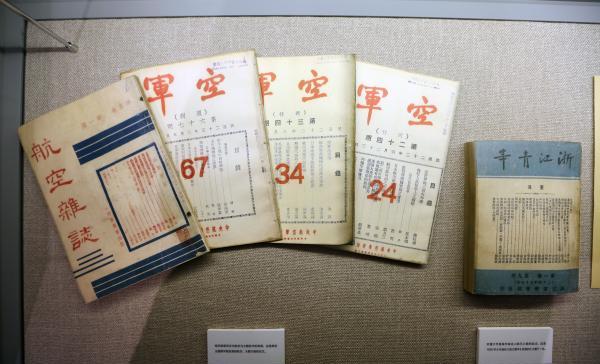Today is the 110th anniversary of Qian Xuesen's birth. Qian Xuesen is the founder of China's aerospace industry, the recipient of the "Two Bombs and One Star" Meritorious Medal, and is known as the "Father of China's Aerospace". Just the day before yesterday, the Shenzhou 13 astronaut crew brought a wonderful "Tiangong Classroom" to teenagers across the country on the Chinese space station, injecting many children with the dream of "becoming an astronaut". The title of "astronaut" was first named by Qian Xuesen.
Before the 1960s, China called the navigation and exploration of spacecraft outside the atmosphere "space navigation", referred to as "spaceflight". Some people once wanted to combine "space navigation" into "aviation", but Qian Xuesen did not agree: "Aviation is flying in the air, and rockets are already in the air, how can it still be called aviation?" ”
In 1964, Qian Xuesen mentioned in the article "Zhu < Aviation Knowledge > Republished" written for the first issue of Aviation Knowledge that navigation in the atmosphere is "aviation", while navigation outside the atmosphere is "air space". However, according to the level of development of human science and technology, Qian Xuesen also realized that for a long time, human space activities can only be limited to the solar system, and "space navigation" is inevitably exaggerated.

Qian Xuesen published a paper on rockets before studying abroad
After comprehensive consideration in many aspects, on September 11, 1967, Qian Xuesen first proposed the term "aerospace" in his speech at the opening ceremony of the demonstration meeting of the retrievable satellite program.
According to Qian Xuesen, he originally got inspiration from Mao Zedong's poem "Survey the sky and look at a thousand rivers from afar." "Human flight within the Earth's atmosphere is called 'aviation', and flight outside the Earth's atmosphere is called 'aerospace'. Future voyages out of the solar system to other stars can be called 'astronautics'. ”
That is, the scope of "aviation" is within the atmosphere, the scope of "aerospace" is from outside the atmosphere to the solar system, and the scope of "aerospace" is outside the solar system.
On July 14, 1970, the central government approved "the development of manned spacecraft and the selection and training of astronauts." At that time, foreign countries generally referred to astronauts as "astronauts" or "astronauts". Qian Xuesen said: "We still call 'astronauts'. Because we have the division of the fields of heaven, sea and air, it is more standardized to call them. Therefore, China has continued the title of "astronaut".
Qian Xuesen was answering questions for his classmates
He also defined it specifically: "astronaut" refers to a person who pilots a manned spacecraft and performs various tasks directly related to a space mission. It is distinguished from both space ground crews and other people who enter space on spacecraft, just as pilots are distinguished from aviation ground crews and passengers.
Facts have proved that the title of "astronaut" is not only in line with the specific conditions of China's manned space industry, but also more in line with Chinese habits.
Moreover, Chinese astronauts have their own exclusive English word , Taikonaut.
As the only three independent manned space countries, China, Russia and the United States have different astronaut titles.
Russian astronauts are called Cosmonauts, a word derived from the Russian word for "universe."
The name of astronauts in the United States or other countries is generally Astronauts, which means no essential difference from Cosmonaut, and later evolved into a more widely used name for astronaut groups in the world.
Space hero Yang Liwei returned to Beijing
In 2003, after Yang Liwei completed China's first manned space mission, the word Taikonaut entered the public eye, and the root taiko came from the pinyin of "space". With the development of China's space industry, foreign media have gradually begun to use Taikonaut to refer to Chinese astronauts. Currently, the term is also included in the Oxford Dictionary, meaning Chinese astronaut .c.
On June 18 this year, at the launching ceremony of the network theme of "Writing the Chapter of Youth on the Land of the Motherland", Yang Liwei said: "The international astronauts are called Astronaut, but we have successfully created a new word, we call Chinese astronauts Taikonaut!" ”
Qian Xuesen was born in Shanghai, studied at a university in Shanghai, and in Shanghai, there are many people and things related to him. In terms of aerospace, the China Aerospace Science and Technology Group, which belongs to the Shanghai Academy of Aerospace Technology, was formerly known as the Fifth Research Institute of the Ministry of National Defense, and Qian Xuesen was the first president.
Zhou Enlai signed a letter of appointment appointing Qian Xuesen as president of the Fifth Research Institute of the Ministry of National Defense
Recently, the Shanghai Academy of Aerospace Technology and its subordinate units have also commemorated Elder Qian in various forms. Shanghai Academy of Aerospace Technology participated in a number of activities such as the symposium of Shanghai Jiao Tong University to commemorate the 110th anniversary of Comrade Qian Xuesen's birth, the opening ceremony of the "See Qian Xuesen Again - Commemorating the 110th Anniversary of Qian Xuesen's Birth Special Exhibition", the launch ceremony of a series of new books to commemorate the 110th anniversary of Qian Xuesen's birth, and the cultural relics donation ceremony; The Shanghai Aerospace 806 Institute held a series of activities to inherit the spirit of Qian Xuesen, and specially invited old experts to bring to the youth the theme discussion activity of "inheriting the spirit of Qian Xuesen and bravely undertaking the mission of strengthening the country", and all branches of 806 institutes also carried out " Passing on the Torch, Inheriting the Past and Opening Up the Future" Theme Party Day Activity, revisiting the old site of the liquid test bench of the 806 Huzhou Base, and remembering Qian Xuesen and other older generation of astronauts.
Column Editor-in-Chief: Li Ye Text Editor: Ju Hefei
Source: Author: Ju Hefei